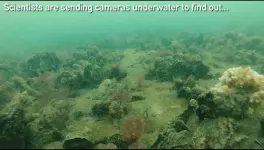(Press-News.org) (Santa Barbara, Calif.) — Coral reefs, those vibrant underwater cities, stand on the precipice of collapse. While rising ocean temperatures and coral bleaching grab headlines, a new essay in Current Biology reveals a hidden layer of complexity in this fight for survival: the often-overlooked roles of the reefs’ smallest inhabitants.
Scientists have long understood the vital partnership between corals and their symbiotic algae, but work by researchers at UC Santa Barbara and University of Georgia highlights how the fate of entire reefs may hinge on the complex interplay between a diverse cast of fish and invertebrate residents. These tiny tenants, it turns out, can be both heroes and villains in the drama.
“It’s like a bustling city teetering on the edge,” explained co-author Adrian Stier, a marine biologist at UC Santa Barbara. “We’re only now realizing that it’s a microcosmic battleground where seemingly insignificant creatures can be the difference between a reef thriving or succumbing to human impacts.”
Take, for example, the humble damselfish. A recent study published in PLOS ONE found that corals inhabited by these tiny fish were far more likely to withstand and recover from heat waves. The researchers suggest the fish provide a crucial nutrient boost to their coral hosts, effectively fertilizing them with their ammonia-rich waste. This finding echoes similar work published in Global Change Biology, where damselfish were shown to help corals resist bleaching by fostering the symbiosis between corals and their photosynthesizing zooxanthellae.
But it’s not just about boosting resources. Another study, also published in PLOS ONE, revealed that certain territorial damselfish act as coral bodyguards, protecting their homes from predators and allowing the corals to expend less energy on defense and more on growth and survival.
“This new research serves as a powerful reminder that even the smallest creatures can play a significant role in the health of our planet,” Stier said.
However, not all coral residents are so benevolent. The essay also highlights the darker side of these micro-relationships. Parasitic snails, like those featured in a Nature Ecology & Evolution study, can weaken their coral hosts, making them more susceptible to bleaching. Other creatures, like the vermetid snail investigated in a study published in Ecology, can disrupt the delicate balance of the reef, outcompeting corals for space and resources.
Even crabs, often lauded for their cleaning services, can turn from helpful housekeepers to harmful hoarders. Research in Coral Reefs revealed that under extreme heat stress, certain crab species turn aggressive, fighting amongst themselves and ultimately harming their coral homes.
“It’s a constant dance between beneficial partnerships and harmful interactions,” Stier said. “Deciphering this intricate web of life is critical if we want to effectively protect coral reefs.”
While tackling climate change remains the ultimate solution to safeguarding coral reefs, understanding the complex dynamics between corals and their miniature residents could be crucial for buying precious time for these vital ecosystems. By identifying and protecting the heroes, and mitigating the damage caused by the villains, scientists hope to tip the scales in favor of coral reef survival.
END
Coral reefs: battlegrounds for survival in a changing climate
The fate of coral reefs may hinge on a diverse cast of minute marine creatures
2024-07-09
ELSE PRESS RELEASES FROM THIS DATE:
Study: Telehealth builds autonomy, trust in treating addiction
2024-07-09
Even as the nation’s opioid epidemic continues to ravage families and communities nationwide — with more than 100,000 Americans dying of drug overdoses each year — stigma remains a barrier for many people accessing treatment for addiction.
A new study from Oregon Health & Science University suggests telehealth may be an important antidote to overcoming stigma and reducing barriers for people seeking out the treatment they need.
The study, published recently in the Harm Reduction Journal, compiled in-depth interviews with 30 people treated for substance use disorder ...
New carbon storage technology is fastest of its kind
2024-07-09
A new way to store carbon captured from the atmosphere developed by researchers from The University of Texas at Austin works much faster than current methods without the harmful chemical accelerants they require.
In new research published in ACS Sustainable Chemistry & Engineering, the team developed a technique for ultrafast formation of carbon dioxide hydrates. These unique ice-like materials can bury carbon dioxide in the ocean, preventing it from being released into the atmosphere.
“We’re staring at a huge challenge — finding a way ...
Socioeconomic status significantly affects fertility treatment outcomes, new study shows
2024-07-09
Novel research, presented today at the ESHRE 40th Annual Meeting in Amsterdam, reveals significant social disparities in achieving live births following assisted reproductive technology (ART) treatment. Women with a research education (PhD) were over three times more likely to achieve a live birth compared to those with a primary school education, while women in the highest income group were twice as likely than those in the lowest income group [1].
Conducted by researchers from the University of Copenhagen and Copenhagen University Hospital (Rigshospitalet), the national, register-based study analysed data from 68,738 women aged 18-45 who underwent ...
IVF and IUI treatment cycles increase across Europe, along with stable pregnancy rates
2024-07-09
Women in Europe are receiving more cycles of in vitro fertilisation (IVF) and intrauterine insemination (IUI), according to data presented today at the ESHRE 40th Annual Meeting in Amsterdam [1].
Preliminary data from the ESHRE European IVF Monitoring (EIM) Consortium [2] reveals a steady and progressive rise in the use of Assisted Reproductive Technology (ART). In 2021, a total of 1 103,633 ART treatment cycles were reported by 1,382 clinics across 37 European countries – a 20% increase from the 919,364 cycles reported in 2020, keeping in mind that this was the year COVID affected the number ...
New 3D imaging method offers promise of better IVF outcomes
2024-07-09
Innovative research, presented today at the ESHRE 40th Annual Meeting in Amsterdam, has introduced a novel 3D imaging model designed to identify features of blastocysts – the early stage of development for an implanted embryo – associated with successful pregnancies. This new approach could transform current blastocyst selection methods, and open avenues for increased pregnancy rates [1].
The shape and structure of blastocysts can predict the success of a pregnancy, aiding blastocyst selection for in vitro fertilisation (IVF). However, selecting ...
Brain & Life® announces new Editor-in-Chief
2024-07-08
MINNEAPOLIS – The American Academy of Neurology (AAN) has named a new editor-in-chief of Brain & Life®, its free patient and caregiver magazine, website and podcast. Sarah Song, MD, MPH, FAAN, an associate professor in the department of neurological sciences at Rush University Medical Center in Chicago, will succeed Editor-in-Chief Orly Avitzur, MD, MBA, FAAN, who will complete her 10-year term on December 31, 2024.
Song, a Fellow of the American Academy of Neurology, will be the third editor-in-chief of Brain & Life since the publication began in ...
University of Cincinnati study: Brain organ plays key role in adult neurogenesis
2024-07-08
University of Cincinnati researchers have pioneered an animal model that sheds light on the role an understudied organ in the brain has in repairing damage caused by stroke.
The research was published July 2 in the Proceedings of the National Academy of Sciences and sought to learn more about how the adult brain generates new neurons to repair damaged tissue.
The research team focused on the choroid plexus, a small organ within brain ventricles that produces the brain’s cerebrospinal fluid (CSF). CSF circulates throughout ...
Small molecules induce trained immunity, opening a new approach to fighting disease
2024-07-08
Vaccines provide a front-line defense against dangerous viruses, training adaptive immune cells to identify and fight specific pathogens.
But innate immune cells — the first responders to any bodily invader — have no such specific long-term memory. Still, scientists have found that they can reprogram these cells to be even better at their jobs, potentially fighting off seasonal scourges like the common cold or even new viral diseases for which vaccines have not yet been developed.
A University of Chicago Pritzker School of Molecular Engineering (PME) team has found several small molecule candidates that induce this trained immunity without the ...
Erasing “bad memories” to improve long term Parkinson’s disease treatment
2024-07-08
BIRMINGHAM, Ala. — Common treatments for Parkinson’s disease can address short-term symptoms but can also cause extensive problems for patients in the long run. Namely, treatments can cause dyskinesia, a form of uncontrollable movements and postures.
In a recent study published in The Journal of Neuroscience, researchers at the University of Alabama at Birmingham took a different approach to dyskinesia and treated it like a “bad motor memory.” They found that blocking a protein called Activin A could halt dyskinesia symptoms ...
Restored oyster sanctuaries host more marine life
2024-07-08
In the campaign to restore Chesapeake Bay, oyster sanctuaries rank among the most hotly contested strategies. But new research suggests these no-harvest areas are working, and not only for the oysters. In a new study published July 4 in Marine Ecology Progress Series, Smithsonian biologists discovered oyster sanctuaries contain more abundant populations of oysters and other animal life—and the presence of two common parasites is not preventing that.
Oysters form the backbone of Chesapeake Bay. Besides injecting millions of dollars into the regional economy each year, they also act as vital habitat and filter feeders that clean the water. But their populations ...
LAST 30 PRESS RELEASES:
Nonprofit leader Diane Dodge to receive 2026 Penn Nursing Renfield Foundation Award for Global Women’s Health
Maternal smoking during pregnancy may be linked to higher blood pressure in children, NIH study finds
New Lund model aims to shorten the path to life-saving cell and gene therapies
Researchers create ultra-stretchable, liquid-repellent materials via laser ablation
Combining AI with OCT shows potential for detecting lipid-rich plaques in coronary arteries
SeaCast revolutionizes Mediterranean Sea forecasting with AI-powered speed and accuracy
JMIR Publications’ JMIR Bioinformatics and Biotechnology invites submissions on Bridging Data, AI, and Innovation to Transform Health
Honey bees navigate more precisely than previously thought
Air pollution may directly contribute to Alzheimer’s disease
Study finds early imaging after pediatric UTIs may do more harm than good
UC San Diego Health joins national research for maternal-fetal care
New biomarker predicts chemotherapy response in triple-negative breast cancer
Treatment algorithms featured in Brain Trauma Foundation’s update of guidelines for care of patients with penetrating traumatic brain injury
Over 40% of musicians experience tinnitus; hearing loss and hyperacusis also significantly elevated
Artificial intelligence predicts colorectal cancer risk in ulcerative colitis patients
Mayo Clinic installs first magnetic nanoparticle hyperthermia system for cancer research in the US
Calibr-Skaggs and Kainomyx launch collaboration to pioneer novel malaria treatments
JAX-NYSCF Collaborative and GSK announce collaboration to advance translational models for neurodegenerative disease research
Classifying pediatric brain tumors by liquid biopsy using artificial intelligence
Insilico Medicine initiates AI driven collaboration with leading global cancer center to identify novel targets for gastroesophageal cancers
Immunotherapy plus chemotherapy before surgery shows promise for pancreatic cancer
A “smart fluid” you can reconfigure with temperature
New research suggests myopia is driven by how we use our eyes indoors
Scientists develop first-of-its-kind antibody to block Epstein Barr virus
With the right prompts, AI chatbots analyze big data accurately
Leisure-time physical activity and cancer mortality among cancer survivors
Chronic kidney disease severity and risk of cognitive impairment
Research highlights from the first Multidisciplinary Radiopharmaceutical Therapy Symposium
New guidelines from NCCN detail fundamental differences in cancer in children compared to adults
Four NYU faculty win Sloan Foundation research fellowships
[Press-News.org] Coral reefs: battlegrounds for survival in a changing climateThe fate of coral reefs may hinge on a diverse cast of minute marine creatures


